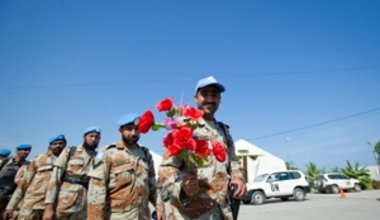12 Sep
2011
Media backgrounder on the Joint Transition Plan
· The Joint Transition Plan was signed by the President, Jose Manuel Ramos-Horta, the Prime Minister, Kay Rala Xanana Gusmao, and the Special Representative of the UN Secretary-General in Timor-Leste, Ameerah Haq, on 19 September 2011.
· Through this initiative, UNMIT aims to bring about a smooth withdrawal of the peacekeeping mission by December 2012. Activities that UNMIT carries out today will either be brought to a successful close by December 2012 or handed to another entity to continue beyond December 2012.
· The purpose of the Joint Transition Plan is to help implement and monitor the completion and hand-over of UNMIT activities by the time the Mission departs.
· The plan focuses on seven key areas:
1. Police and security
2. Justice, rule of law and human rights
3. Democratic governance
4. Socio-economic development
5. Mission support and logistics
6. Training for Timorese staff
7. Impact on the local economy
· The Government and UNMIT will implement the Joint Transition Plan together. UNMIT's expected withdrawal is guided by four assumptions.
1. Stability prevails
2. National elections take place in accordance with international standards
3. A government is formed based on the outcome of the elections
4. The political opposition has space to operate in line with democratic principles
· This innovative plan is the first of its kind in peacekeeping. UNMIT is the first peacekeeping mission to prepare a joint transition plan with a government. It is also the first to manage the transition plan jointly through a High Level Committee involving the President, Prime Minister and the SRSG.
· The Joint Transition Plan builds on the strong partnership between Timor-Leste and the United Nations – a partnership that began with the UN's support for Timor-Leste's struggle for independence and the historic popular consultation in 1999.
· Since then, the UN has worked closely with the people of Timor-Leste to build an environment of peace and security and strong, reliable national institutions. The Timorese people's bold efforts have generated the stability and economic growth necessary for Timor-Leste to move its focus from security to its long-term Strategic Development Plan.
· The Joint Transition Plan is a living document, subject to review and adjustment as the transition unfolds.
· The expected end of the peacekeeping mission in Timor-Leste is a cause for celebration. UNMIT can make a planned withdrawal because the people of Timor-Leste have made huge progress in establishing political systems and institutions.
· Timor-Leste's electoral management bodies are planning and implementing the 2012 elections with limited UN support. Timor-Leste's government ministries are functioning and its justice system is growing in strength. The national police force is responsible for policing throughout the country – and the crime rate is stable.
 UN
UN United Nations Peacekeeping
United Nations Peacekeeping


